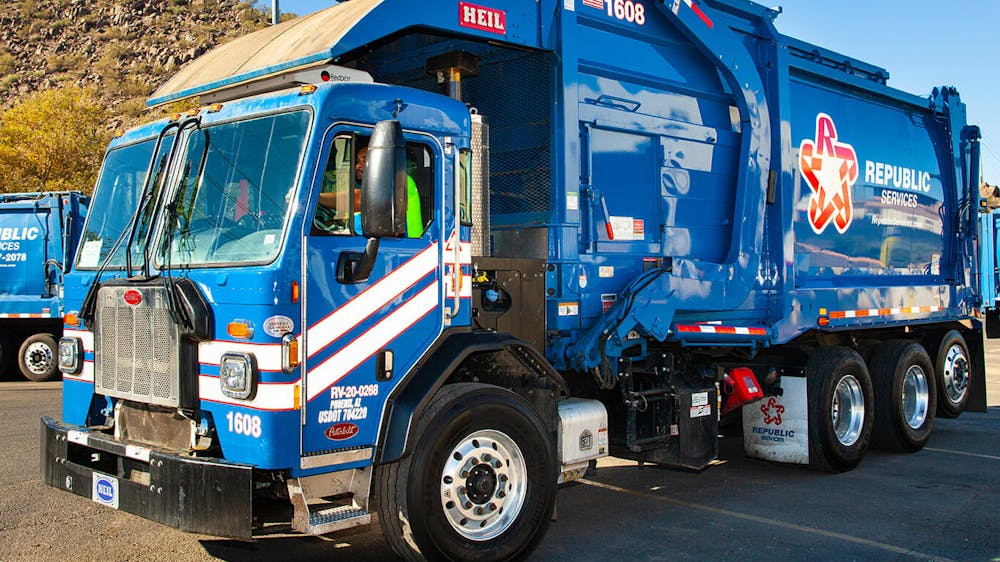Republic Services is making sure they are ahead of the electric vehicle trend, according to a Republic Services presentation at the Maricopa Association of Governments Solid Waste Advisory Committee meeting.
Brett Rogers, vice president of operations technology, presented Republic Services sustainability initiatives with electric vehicles on Sept. 12, 2023. Republic Services is a waste disposal company that specializes in sustainable environmental solutions operating with 40,000 employees in 49 states, according to the company website. The headquarters is located in Phoenix with 5,000 employees in Arizona.
The company said earlier this year its goal was for 50% of all fleet purchases to be electric vehicles by 2028. Republic Services joined a long-term deal with Oshkosh Corporation to create a fully integrated electric recycling and trash collection truck prototype that will be operating in Phoenix by the end of the year. This vehicle will run entirely on electric energy instead of compressed natural gas or diesel.
Jon Vander Ark, CEO and President of Republic Services, has been vocal about the goal of becoming less reliant on diesel powered vehicles.
Vander Ark “sees electrification as a place to improve customer experience, improve our driver experience, and really overall reduce our emissions,” Rogers of Vander Ark.
According to Republic Services, moving to fully electric energy, based off of the California grid electricity, can have up to an 85% improvement in carbon intensity emissions reduction. EVs can reduce maintenance costs, operation costs and increase driver safety by removing the engine from the cab of the car.
The company takes multiple factors into consideration when determining viable locations for this technology in these early stages. Existing infrastructure, willingness from the city for integrating EV technology, and the ability to properly service customers all play roles in the success of these locations.
The largest hindrance in the electrification process is a lack of charging infrastructure, according to Rogers. The battery packs on the large electric vehicles are about four-to six-times the average EV and require a direct current charger. The typical timeline to build site infrastructure including a transformer, conduit, switchgear and charger is anywhere from 18 to 24 months.
In addition to the availability of power utilities, Republic Services looks for locations where incentives or grants may be available.
“We are looking for really good municipal partners,” said Rogers. “We want to build in places where people want EVs, and they want to be ahead of that trend in the new technology.”
The Solid Waste Advisory Committee consists of representatives from the cities of Maricopa County selected by the Maricopa Association of Governments to give expertise on topics regarding solid waste management. Members from the committee raised concerns for the new technology. Robert van den Akker, the environmental manager for the City of Buckeye, brought up concerns surrounding the extreme heat Arizona faces.
“The other issue is just recharge because recharging a battery in high heat is also a wall to overcome,” said van den Akker.
According to Rogers, there are ways to combat the power draw during the heat such as cooling the cabin of the vehicle before driving. Republic Services hopes to gain more information on this concern through running the prototype in Phoenix and expects insights within the next year.
Ramona Simpson, the Public Works contact for the fleet of the Town of Queen Creek, raised concerns with providing waste services to long-distance routes.
“I am excited about both the challenges because I think we will find solutions and how to make this work,” said Simpson. “We are a pretty tough environment out here in the west, so I think it will be good to have [Republic Services] get some experience out here.”
There are advancements expected to be made in EV technology that can help overcome challenges that face this initiative, according to Rogers.
“This is not a one-for-one swap with every single truck in your fleet right now. What this is is a one-for-one swap on your easiest routes,” said Rogers.

